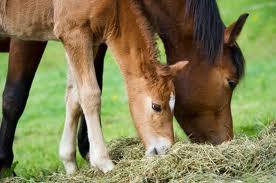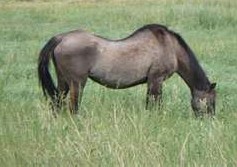Ón Searrach go dtí an Staigín — and my last excuse for “Slán Go Foal” Posted by róislín on Aug 25, 2012 in Irish Language
(le Róislín)
As promised in the last posting, this blog will discuss the terms for the life cycle and various types of horse. Most prominent, of course, is “capall,” but, as previous blaganna have hinted, there are téarmaí go leor to use according to comhthéacs (liteartha, srl.), aois and gnéas of the horse, and geographic specifications. And, naturally, I’m cherishing every minute of writing this, since I had so much fun with the “imeartas focal,” which you may have spotted by now.
capall, pl: capaill, horse, horses
For terms more typical in literary usage, we’ve seen:
“each (pl. eacha), which also gives us “eachaí” (a jockey), “eachaire” (a groom),” and “eachsheamair” (horse-shamrock)
marc (pl. mairc), which also gives us “marcachas” (horsemanship) and “marclach” (cavalcade)
pónaí (pl. pónaithe) is used for specifically for ponies, as opposed to horses as such. Two other words for “pony” are “capaillín” (as in “Myles na gCopaleen”) and “gearrchapall,” lit. short-horse! I’ve never found an exact equivalent to the verb “to pony up” in Irish. Lá éigin, b’fhéidir, it’ll turn up.
beithíoch can also mean horse, although more typically it refers to cattle. “Na beithígh” can mean the horses, the cattle, or a combination.
B. For “aois” (age), we have the following, aside from “capall,” for an adult horse:
searrach lárach (lit. mare-foal) OR cliobóg, filly (young female). “Cliobóg” also means a “big strong girl.”
bromach, colt (young male), which you might remember from the proverb: Is minic a rinne bromach gioblach capall cumasach.
searrach, pl. searraigh, foal. Unlike English, which verbifies the noun “foal” (to foal), Irish simply uses the verb that means “to give birth” (breith, with the widely used irregular form, rugadh, for “was born,” as in “Rugadh in Éirinn é.”)
At the other extreme are words such as:
staigín, worthless creature, worthless horse, jade, nag
As I said in the last blog, I don’t really like calling any animal “worthless,” but it’s a typical translation of staigín.
capall a bhfuil log sa droim aige (aici): a swaybacked horse, lit. a horse with a hollow in its back (not exactly a succinct phrase, but it gets the point across). To be really technical, we could say “capall a bhfuil lordóis (lordosis) air (uirthi).
C. Maidir le “gnéas” (sex)
stail (pl: staileanna), stallion. This noun is grammatically feminine, which has always baffled me. A “stail ghraíre” is a “stud-horse.” A “breeding stud” can also be a “graí,” also grammatically feminine, or a “graíre” [gruh-EERzh-uh], which is grammatically masculine. Hmmm, am I missing something here?
láir (pl: láracha), mare, though sometimes “capall” is used as a generic term. A “mare in foal” is “láir shearraigh” and a “stud-mare” is “láir ghraí.”
And then, while we’re on the topic, we’ve got the gearrán (gelding). Remember him? The word’s in the phrase “nead gearráin,” used for a “mare’s nest,” but literally meaning a “gelding’s nest.” Bhuel, actually, “gearrán” can also mean a “small horse” or a “nag.” As for the “nest” part, bhuel, is meafar meafar.
D. According to the work they’re suited for:
capall cogaidh, a charger
capall céachta, plow-horse
capall rása, race-horse, the subject of another proverb: Ní dhéanfadh an saol capall rása d’asal, the Irish equivalent for “You can’t make a silk purse out of a sow’s ear,” but minus the silk, the purse, the sow, and the ear. In other words, the meafar (metaphor) is completely different.
capaillín póló, polo pony
And the one who probably resists both béalbhach and blaincéad, not to mention diallait, is the “capall gan bhriseadh” (bronco, lit. horse without breaking, i.e. an unbroken horse)
E. Some geographical considerations:
capaillín Chonamara, Connemara pony
capaillín portaigh Chiarraí, Kerry bog pony
capaillín Breatnach, Welsh pony, an equine neighbor
Shetland pony: sealtaí [SHAL-tee] or Sealtannach, neither of which actually includes the word “pony.” Seems like that first one could lead to some confusion with the “sheltie” dog, but, at least formally speaking, the Irish phrase for that breed of dog is “Sípéir (Shepherd) Sealtannach,” that is, when it’s not busy being a “toonie,” ach sin scéal eile!
And a bit of miscellaneous:
graí can also be a collective noun meaning “horses.” “Graífheirm” [GREE-ERzh-um] is a “stud-farm.”
dobhar-each is a hippopotamus. More or less like the English word (hippos, horse + potamious, of river) it literally means “water-horse.” “Dobhar” [DOW-ur] means “water,” but is not nearly as widely used as “uisce” (water) and is cognate to Welsh dŵr (water). “Dover” is also related to “dobhar” and “dŵr.”
“eohippus” remains as “eohippus” in Irish but “hippodrome” adapts the English sound to Irish, with two variations “hiopadróim” and “hipeadróm“!
rosualt, walrus, is sometimes referred to as “sea-horse,” a term which doesn’t always means the tiny member of the pipefish family, which is, more straightforwardly, “capall mara.” “Walrus,” and by association, “rosualt,” are derived from the Danish for “whale-horse.”
Of course, there’s also the mythological “sea-horse”, the “each uisce” (lit. water-steed), also known as the “water horse.” You might have seen one of those, sort of-ish anyway, if you saw “Water Horse,” the 2007 movie, with music by the Chieftains. Why so “ishy”? The creature in that film was more “Nessie”-ish than “capall“-ish, but at least the movie is based on the idea of the Kelpie. The exact etymology of “kelpie” is unclear, but it is presumed to derive from “colpa,” which in Scottish Gaelic means “cow” or “horse,” although in Irish, modern Irish at least, the word has undergone a semantic lurch, to mean a “collop,” which was a unit of grazing land. Related words include “colpach” (yearling, heifer, or bullock) and in Scottish Gaelic, “colpach” (heifer, steer, colt).
And to conclude with the obvious, a “mustang” is also a “mustang” in Irish, but do note the plural and possessive forms, mustaing (plural) and mhustaing ([WUS-ting]of a mustang)
Bhuel, sin é don bhlag seo. And unless I dream up some other reason for writing about foals, and announcing it in advance, I doubt I’ll have much chance to use “Slán go foal” again. But it was fun while it lasted. Slán go fóill — Róislín

Build vocabulary, practice pronunciation, and more with Transparent Language Online. Available anytime, anywhere, on any device.






Leave a comment: